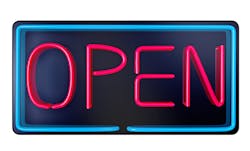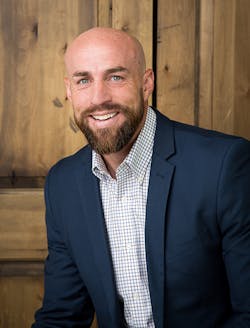The COVID-19 pandemic has done more to disrupt HVAC business operations than any event that ever came before. 13 SEER was nothing like this.
Acknowledging the reality of ongoing health concerns and social distancing cautions, service businesses nonetheless thrive on customer contact, and must continue to keep appointments, so that those businesses may survive, and continue on once this crisis has passed. To do that, HVAC businesses must keep employees on the payroll, and do everything they can to schedule service or installations, including ramping up customer outreach.
Brigham Dickinson and his team at Power Selling Pros are not standing idle; they’re doing something about that vital need contractors have: to continue to schedule and keep appointments. Critics may cry ‘profiteering,’ but HVAC businesses play a lead role in keeping homes warm, cool, and most importantly, served by cleaner air, and they can’t stand by waiting for the phone to ring because they’re afraid of being called mercenary.
HVAC and plumbing businesses must keep employees on their payrolls, and do everything they can to schedule service or installations, including ramping up customer outreach.
We recently spoke about this issue with Dickinson, president of this 12-year-old, Jordan, Utah-based company —a leading service business coaching organization that teaches technicians, customer service representatives and business leaders to create a phenomenal customer experience. PSP recently began offering free resources to their HVAC contractor customers who are struggling with how to continuously serve homeowners in this greatly disrupted economic time. It’s called the “Your People Program." The first month of the training is free, and $500 per month thereafter for the next four months, with barely any margin of profit for PSP.
“The HVAC industry is hurting, but we’re all in this together,” said Dickinson. “This is an opportunity to step up and serve others. My team and I are ready to provide contractors with the tools to help their customers in ways that enrich their lives and create long-term brand loyalty.”
Dickinson recalled that when the business shutdowns and layoffs began, HVAC contractor customers started calling PSP at the rate of about 50 per week, to say they couldn’t continue to afford Power Selling Pros’ monthly services.
“Overnight, we lost $30,000 in residual income,” he shared. “But when it all came down, I knew cancelling was not what they should be doing. When service calls aren’t coming in, you don’t let people go, you train your team to call out.
“I was going to write a bunch of scripts and teach contracting business teams how to make outgoing phone calls. If calls aren’t coming in, they need to be calling out. If technicians don’t have any calls to go on, bring them into the office and train them to do outbound calls.
The “backstory” to the COVID-19 drama as it affects contractors – and indeed, multiple movie scripts are most likely under development — is framed in how HVAC business owners reacted to what was happening during those early days in March, when businesses were forced to close and people to hunker.
“Some saw the crisis for what it was,” Dickinson said, “and, the interesting thing about a crisis, is that on one side there is ‘clear and present danger’. And when you react to clear and present danger, you have a tendency to act out of fear. So, you lay off your CSRs and technicians, and you run the business on a skeleton crew. The media or other influences serve to motivate you to react in a certain way, and that’s what can happen.
“But why would you lay off employees at a time when you can do more than ever before to illustrate your readiness to help customers; and at a time when some of them need real help?” he asked.
“That help may or may not involve 'selling something,' but at the heart of it all, is an understanding of your role as a 'service' company.
“The other side of crisis is opportunity,” Dickinson continued, “but the last thing we want to do in a crisis is to see this as an opportunity for self gain rather than as an opportunity to serve. Because, right now you’ve got homeowners who are alone, fragile, and feeling despair like never before.”
Dickinson explained that, to turn tail on offering help, including beneficial home comfort or indoor air quality products, and cutting service staff would only serve to exacerbate what has been the HVAC industry’s greatest ongoing challenge: keeping employees.
“The biggest problem the HVAC industry has had over the last five to 10 years has been finding and hiring technicians and other personnel. And now, when COVID-19 comes down, we’re doing the reverse? You built your business over 10-20 years, and now you’re going to let COVID-19 take it? Absolutely not!”
There are four main “Your People Program” scripts. One begins by basically asking how the customer is doing, and if they need any essentials delivered to their home. From there, the conversation centers on overworked AC systems, humidification or dehumidification and indoor air quality.
“Dealers have never had an opportunity like this, to lead,” Dickinson continued. “They are enrolled in this for credit, and it is either going to be ‘pass or fail’ as a leader, and in engaging their own team to get behind them. Leadership is about how many people will follow you. And if they will follow you in this crisis, they will follow you anywhere.”
Dickinson said the unprecedented COVID-19 pandemic is an event that service business owner will hopefully look back on as a moment of success rather than failure.
“If this were a movie,” he said, “we want to be the hero.”
About the Author
Terry McIver
Content Director - CB
As director of content for Contracting Business, he produces daily content and feature articles for CB's 38,000 print subscribers and many more Internet visitors. He has written hundreds, if not two or three, pieces of news, features and contractor profile articles for CB's audience of quality HVACR contractors. He can also be found covering HVACR industry events or visiting with manufacturers and contractors. He also has significant experience in trade show planning.


